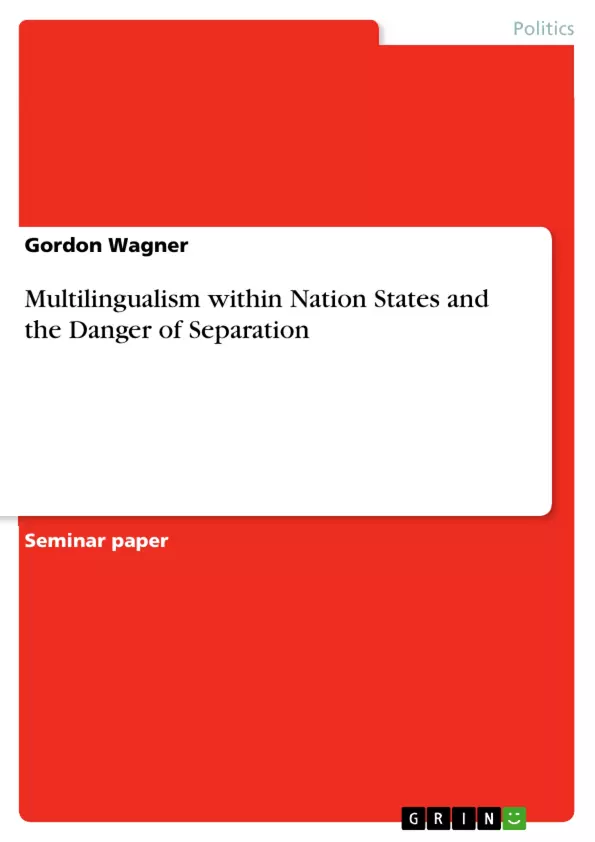Worldwide, there are almost 6,800 languages in 228 countries and approximately 200 languages that have more than one million native speakers. There are even less official nation states existing, according to various sources between 192 and 195. Obviously, not every single country or nation state exclusively contains citizens speaking only one language and we don’t need to seek out long, but instead take a look to member states of the European Union (EU) as there are countries like Belgium, Luxembourg and Ireland that are officially tri- and/or bilingual.
On one hand, this suggests the existence of a considerately strong movement of native speakers among the respective country’s citizens that are not willing to accept merely one mother language (as is the case in Ireland, where both Irish and English are officially recognized idioms). On the other hand, it might indicate the existence of a potential language conflict situation – and indeed there are multilingual nation states in which this proves to be the case. There are many such examples throughout the world, e.g. Belgium, Spain and its various autonomous communities) or the Canadian province Québec. In fact, established nation states are threatened to break in part due to their citizens speaking utterly different languages and instead of just one with varying accents and/or dialects. So how do countries deal with these issues? What are the possible consequences of using more than one official language among an established nation state and how might this shape the citizens’ perception and consciousness on a wider range?
Inhaltsverzeichnis (Table of Contents)
- Multilingualism within Nation States and the Danger of Separation
- Canada and its province Québec
- The French Language in Québec
- Language Laws and Politics
- Belgium and the EU
- The Situation in Belgium
- The Baltic States: Estonia, Latvia, Lithuania
- Language Politics in the Baltic States
- Conclusion: What Does the Future Hold?
Zielsetzung und Themenschwerpunkte (Objectives and Key Themes)
This essay examines the impact of multilingualism within nation states, focusing on potential dangers of separation arising from linguistic differences. It specifically analyzes the experiences of Canada, Belgium, and the Baltic states to explore the complexities of language politics and their relationship to national identity and historical context.
- The historical and contemporary challenges of maintaining linguistic diversity within nation states
- The role of language laws and policies in shaping national identity and promoting or hindering linguistic equality
- The connection between language, national consciousness, and political unity, particularly within the context of the European Union
- The influence of globalization and the rise of English on the status of national languages
- The potential for linguistic differences to fuel separatist movements and threaten national cohesion
Zusammenfassung der Kapitel (Chapter Summaries)
- Canada and its province Québec: This chapter delves into the historical and contemporary dynamics of French and English in Canada, with a particular focus on Québec. It examines the factors that have contributed to the decline of French as a dominant language in Québec, including anglicisms, discrimination against francophones, and the influence of English as a global language. The chapter also explores the role of language laws and policies in attempting to preserve French culture and identity.
- Belgium and the EU: This chapter analyzes the linguistic situation in Belgium, highlighting the coexistence of Dutch, French, and German, and the ongoing tensions between Flanders and Wallonia. It examines the absence of significant conflict between citizens despite political differences and explores the possibility of a shared Belgian identity beyond language differences.
- The Baltic States: Estonia, Latvia, Lithuania: This chapter examines the linguistic challenges faced by Estonia, Latvia, and Lithuania, particularly in the years leading up to their EU membership in 2004. It discusses the historical context of language politics in these countries and their efforts to address potential threats to national unity stemming from linguistic diversity.
Schlüsselwörter (Keywords)
The key terms and concepts explored in this essay include multilingualism, nation states, language politics, national identity, separatism, language laws, linguistic diversity, globalization, and the European Union.
Frequently Asked Questions
How many languages and nation-states exist globally?
There are approximately 6,800 languages in about 228 countries, while there are only between 192 and 195 official nation-states.
Why does multilingualism pose a danger of separation?
Linguistic differences can fuel separatist movements and threaten national cohesion when citizens feel their mother tongue is not recognized or is being marginalized.
What is the linguistic situation in Québec?
The essay explores the decline of French in Québec due to the influence of English and the role of language laws in preserving francophone culture and identity.
How does Belgium manage its linguistic diversity?
Belgium coexists with Dutch, French, and German speakers. Despite political tensions between Flanders and Wallonia, a shared Belgian identity often persists beyond language differences.
What challenges did the Baltic states face regarding language?
Estonia, Latvia, and Lithuania had to address language politics to ensure national unity and meet requirements for EU membership following their historical contexts.
How does globalization affect national languages?
Globalization and the rise of English as a global lingua franca often put pressure on national languages, shaping citizens' perception of their own identity.
- Quote paper
- Gordon Wagner (Author), 2011, Multilingualism within Nation States and the Danger of Separation, Munich, GRIN Verlag, https://www.grin.com/document/171585



